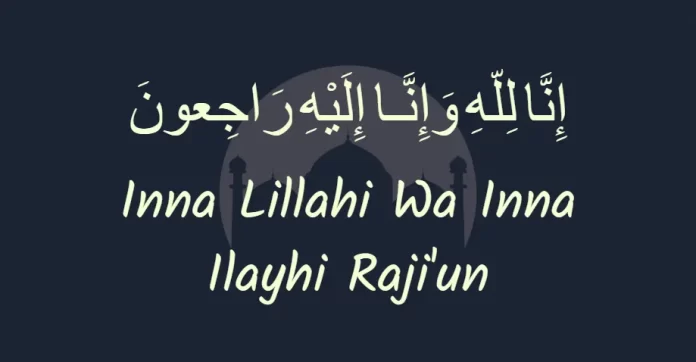Introduction
“Inna Lillahi wa inna ilayhi raji’un” is a profound expression deeply rooted in Islamic faith. Translated as “Indeed, to Allah we belong, and to Him, we shall return,” this phrase offers a spiritual framework for understanding loss, suffering, and the transient nature of life. This blog explores the depth, significance, and multifaceted implications of this powerful statement, providing insight into its usage, emotional resonance, and spiritual guidance.
The Meaning of “Inna Lillahi Wa Inna Ilayhi Raji’un”
Literal Translation and Context
At its core, “Inna Lillahi wa inna ilayhi raji’un” encapsulates the essence of human existence within the Islamic worldview. “Inna Lillahi” means “Indeed, we belong to Allah,” affirming the belief that everything in creation is owned by and returns to God. “Wa inna ilayhi raji’un” translates to “and to Him, we shall return,” reminding believers of the inevitable journey back to the Creator.
Arabic:
إِنَّا لِلّهِ وَإِنَّـا إِلَيْهِ رَاجِعونَ
Transliteration:
Inna Lillahi wa inna ilayhi raji’un
Translation:
Indeed, to Allah we belong, and to Him we shall return.

Quranic Origin
This phrase is drawn from the Quran, specifically Surah Al-Baqarah (2:156), which states: “Who, when disaster strikes them, say, ‘Indeed we belong to Allah, and indeed to Him we will return.'” The verse encourages Muslims to respond to life’s trials with patience and faith, recognizing that every hardship has a divine purpose.
The Role of “Inna Lillahi Wa Inna Ilayhi Raji’un” in Daily Life
A Source of Consolation in Times of Loss
Muslims often recite this phrase upon hearing news of death or misfortune. It serves as a reminder that all beings are under Allah’s care, and returning to Him is a part of life’s natural cycle. This perspective provides comfort, helping individuals cope with grief and loss by placing their trust in God’s wisdom and mercy.
Expressing Resilience and Patience (Sabr)
“Inna Lillahi wa inna ilayhi raji’un” embodies the principle of Sabr, or patience, which is highly valued in Islam. By acknowledging God’s sovereignty, believers are encouraged to face challenges with steadfastness and trust in His plan. This phrase fosters a mindset of endurance, encouraging individuals to maintain their faith during difficult times.
Spiritual Significance and Reflection
Connecting with the Divine
Reciting “Inna Lillahi wa inna ilayhi raji’un” is not merely a verbal act but a spiritual exercise that strengthens one’s relationship with Allah. It is an acknowledgment of His ultimate authority and a reminder of the transient nature of worldly life. This realization prompts believers to focus on their spiritual journey and prepare for the hereafter.
Cultivating Humility and Gratitude
Understanding that everything belongs to Allah and will eventually return to Him fosters humility. It shifts the focus from material possessions and worldly attachments to spiritual growth and ethical conduct. Additionally, it encourages gratitude for the blessings received, knowing they are temporary and entrusted by God.
Cultural and Social Dimensions
A Universal Expression in the Muslim World
Across diverse cultures within the Muslim world, “Inna Lillahi wa inna ilayhi raji’un” is a universally recognized and respected expression. It transcends linguistic and cultural barriers, uniting Muslims in their shared faith and understanding of life’s impermanence.
Impact on Social Practices and Mourning Rituals
This phrase is integral to Islamic mourning rituals and social practices surrounding death and loss. It is commonly recited during funerals, condolences, and moments of collective grief, reinforcing community solidarity and mutual support.
Comparative Perspectives
Similar Concepts in Other Religions and Philosophies
While “Inna Lillahi wa inna ilayhi raji’un” is uniquely Islamic, its themes resonate with concepts in other religious traditions. For instance, the Buddhist idea of impermanence (Anicca) and the Christian acceptance of God’s will in suffering reflect similar understandings of life’s transient nature and the importance of spiritual resilience.
The Psychological Benefits of Acceptance
Modern psychology recognizes the therapeutic value of acceptance in coping with loss and adversity. By embracing the principles embedded in “Inna Lillahi wa inna ilayhi raji’un,” individuals can find peace and meaning, reducing anxiety and fostering emotional well-being.
Listen to it here
Conclusion
“Inna Lillahi wa inna ilayhi raji’un” is more than a phrase; it is a profound declaration of faith, resilience, and spiritual wisdom. It provides Muslims with a framework for understanding and navigating the challenges of life, reinforcing their connection to Allah and their community. By embracing this expression, believers find comfort, strength, and a deeper appreciation for the divine order, ultimately enriching their spiritual journey.
This blog has aimed to shed light on the multifaceted significance of “Inna Lillahi wa inna ilayhi raji’un,” exploring its linguistic, spiritual, cultural, and psychological dimensions. Through this exploration, we gain a greater appreciation for its timeless relevance and enduring power in the lives of millions.
Frequently Asked Questions (FAQs)
1. What does “Inna Lillahi wa inna ilayhi raji’un” mean?
Answer:
“Inna Lillahi wa inna ilayhi raji’un” means “Indeed, to Allah we belong, and to Him we shall return.” It is a phrase used by Muslims to express their faith and acceptance of God’s will, especially in times of loss or hardship.
2. When is “Inna Lillahi wa inna ilayhi raji’un” recited?
Answer:
This phrase is typically recited upon hearing news of someone’s death or when experiencing any form of calamity or loss. It serves as a reminder of the transient nature of life and the belief in returning to Allah.
3. What is the origin of “Inna Lillahi wa inna ilayhi raji’un”?
Answer:
The phrase originates from the Quran, specifically Surah Al-Baqarah (2:156), where it is mentioned as part of a verse encouraging patience and faith in response to life’s trials.
4. What is the significance of “Inna Lillahi wa inna ilayhi raji’un” in Islam?
Answer:
The phrase signifies the Muslim belief in God’s ultimate authority and the temporary nature of life. It helps believers find comfort and patience in difficult times by reinforcing their faith in God’s wisdom and plan.
5. Can “Inna Lillahi wa inna ilayhi raji’un” be used in situations other than death?
Answer:
Yes, it can be used in any situation of loss or calamity, not just death. It is a way for Muslims to express their trust in Allah’s plan and seek comfort in times of distress.
6. How does “Inna Lillahi wa inna ilayhi raji’un” help in coping with grief?
Answer:
The phrase helps by providing a spiritual perspective on loss, reminding believers of the temporary nature of worldly life and the eternal nature of the hereafter. It encourages patience, resilience, and trust in God’s greater plan.
7. Is “Inna Lillahi wa inna ilayhi raji’un” a prayer?
Answer:
While not a prayer in the conventional sense, it is a declaration of faith and submission to Allah’s will. It reflects the believer’s acceptance and trust in God’s decree.
8. What is the emotional impact of reciting “Inna Lillahi wa inna ilayhi raji’un”?
Answer:
Reciting this phrase can bring a sense of peace and solace, helping individuals to process their grief and find strength in their faith. It serves as a reminder of the divine wisdom behind every event.
9. How is “Inna Lillahi wa inna ilayhi raji’un” related to the concept of patience (Sabr) in Islam?
Answer:
The phrase reinforces the concept of Sabr (patience) by encouraging believers to trust in Allah’s plan and remain steadfast in the face of adversity. It is a reminder that patience is a key virtue in navigating life’s challenges.
10. Can non-Muslims use “Inna Lillahi wa inna ilayhi raji’un”?
Answer:
While the phrase is deeply rooted in Islamic belief, its use by non-Muslims should be approached with sensitivity to its religious significance. It is primarily a declaration of faith in Islam, so its use outside this context may not carry the same meaning.

